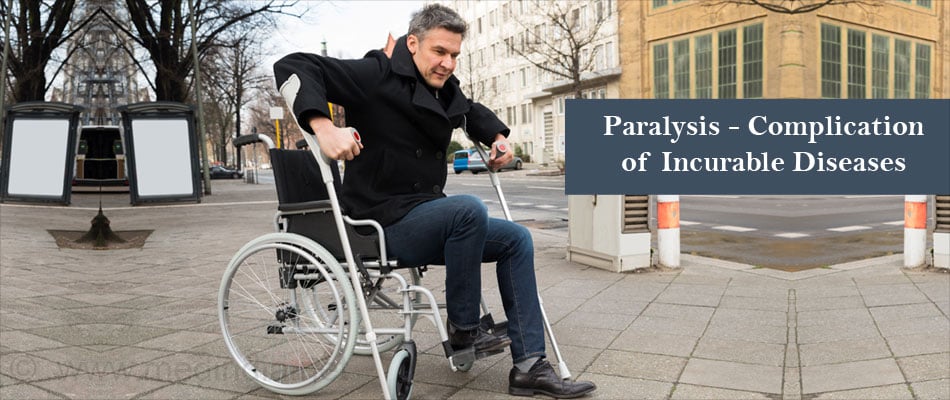- Lucy Selman et al; Meeting Information Needs of Patients with Incurable Progressive Disease and Their Families in South Africa and Uganda Multicentre Qualitative Study; BMJ
- Dr. Krishna J Vagheal; Effect of Psychological Well Being, Death Anxiety and Depression on Curable and Incurable Disease Patients; The International Journal of Indian Psychology 2015
What are Incurable Diseases?
Incurable diseases are disorders of infectious, non-infectious, genetic, metabolic, neoplastic or autoimmune nature that do not currently have a cure. Incurable diseases include rare diseases which in 80% of cases are genetic in nature.
These disorders may be highly fatal (e.g. rabies, Ebola) or progress slowly resulting in disabling complications that affect the quality and duration of the life of the patient. Often, these conditions affect both the physical and mental wellbeing of the patient and their close ones requiring counseling and supportive mechanisms for their welfare.

It must be remembered that though the list of incurable diseases is long, many of these can be adequately controlled with medications which the person may have to take lifelong and the patient goes on to live a normal life. Also, with rapid advancements in medical science, a disease which is considered incurable today may be out of the list in the near future.
What are the Causes of Incurable Diseases?
Incurable diseases can affect any person in the community. Some of these diseases are genetic in nature while others may be due to unhealthy behaviors, lifestyle and nutrition. Often, the environment plays a role in early onset of the disease.
Some of the causes of incurable diseases include the following
- Infectious Causes: AIDS, Ebola, poliomyelitis, rabies
- Autoimmune Causes: Systemic lupus erythematosus, multiple sclerosis, and inflammatory bowel disease
- Genetic Causes: Progeria, Down’s syndrome, Huntington’s disease
- Metabolic Causes: Lipid storage disorders, glycogen storage disease
- Neoplastic Causes: Advanced cancers
- Lifestyle Causes: Diabetes, hypertension
What are the Risk factors for Incurable Diseases?
Risk factors for incurable diseases include non-modifiable risk factors which cannot be controlled and modifiable risk factors which can be controlled.
Genetic factors are non-modifiable risk factors for incurable diseases. However, gene therapy may deal with these risk factors in the future. Modifiable risk factors include unhealthy and unhygienic behaviors, lifestyle choices, malnutrition, stressful lifestyle, environmental hazards and pollutants. These can be identified and dealt with before they can cause incurable diseases.
Knowledge of these factors can be used to educate the public and take appropriate public health measures to prevent the occurrence of these disorders.
What are the Complications of Incurable Diseases?
Incurable diseases that are highly fatal in nature (like rabies) can result in immediate death. Rare incurable diseases often lead to premature death due to the disease or its complications.
Complications that occur in these disorders are often a result of the degenerative nature of the condition on the body, or failure of the body to combat the disease or secondary infections that may further worsen the immune system.
Muscle weakness, paralysis, single or multi-organ failure, recurrent infections, secondary infections, septicemia (blood infection), depression, mental disturbances, suicidal tendencies, drug resistance and side effects of long term medications are some of the complications observed.

What are the Tests for Incurable Diseases?
Testing for an incurable disease is often a psychological dilemma for the patient and requires prior and post counseling due to the incurable nature of the disease. Frequent follow up is required to maintain the mental and physical wellbeing of the patient.
Early testing like prenatal screening tests are available at tertiary health centers which can help in identification of genetic disorders that may occur in the offspring of the concerned. Genetic counseling and family planning allow in better decision making and prevention of incurable diseases of genetic nature. But ethical concerns have been raised regarding these tests.
Screening and diagnostic tests are available for incurable diseases to identify infectious organism or antigen, antibodies, bio markers that are linked to these disorders. Highly prevalent diseases often have tests available at government or public institutions but rare disease testing may be available only at high end institutions.
How are Incurable Diseases Treated?
As per definition, there is no cure for these disorders. However, many of these diseases can be controlled and complications can be prevented with medications. Certain conditions like cancer if identified very early can be treated but require follow up on a regular basis to rule out recurrence.
Supportive measures may be used to improve the quality of life of the patient. Physiotherapy, rehabilitative support and equipment, pain and palliative medications may be required to cope with degenerative complications of certain disease, and prevent secondary infection.
Counseling of the patient and the family is often required to improve the mental wellbeing and to prevent depression, anxiety, despair and death.
How to Prevent Incurable Diseases?
- Healthy and hygienic behavior and habits can help in preventing exposure to diseases of infectious nature and environmental toxins.
- A physically active lifestyle and a balanced diet will reduce exposure to contaminants predisposing factors and prevent chronic debilitating disorders like diabetes and hypertension.
- Pre-natal screening can help in early identification of genetic defects and allow in counseling and family planning.

- Early screening can help in identification of pre-invasive neoplastic conditions, early cancers and treatment to prevent further progression to cancer. Early identification of infectious incurable diseases can help in preventing the spread of the disease spread to the community by isolating the patient.
- Vaccination can help in preventing diseases like hepatitis B, poliomyelitis, and rabies that are incurable.
- Research taken up on these diseases can help to provide information to the medical community on the warning signals and important biomarkers that should be looked for in a patient.







